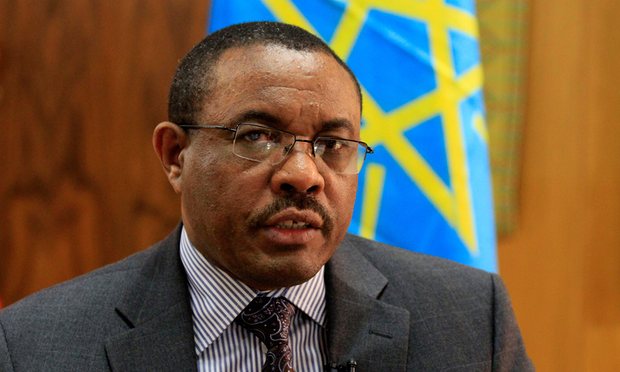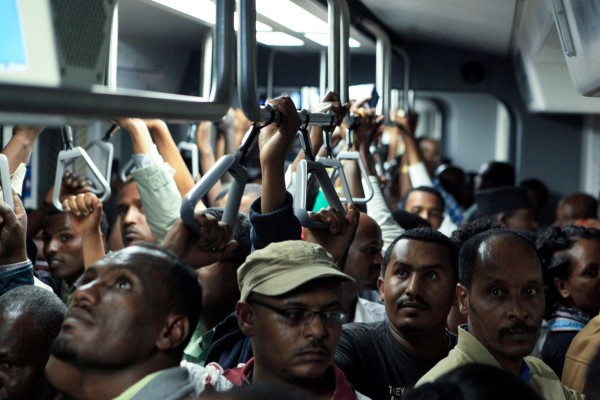PBS: Escaping Eritrea … [Read More...] about ካብ ውሽጢ ቤት ማእሰርታት ኤርትራ
Reed Kramer for AllAfrica |
"We don't take sides; we help you see more sides."

Published:
PBS: Escaping Eritrea … [Read More...] about ካብ ውሽጢ ቤት ማእሰርታት ኤርትራ
Reed Kramer for AllAfrica |
Hailemariam Desalegn says the key to keeping the peace in Ethiopia is a tooth-and-nail fight against poverty
AllAfrica’s Reed Kramer interviewed Ethiopia’s prime minister, Hailemariam Desalegn, after a US-Africa business summit in Addis Ababa in February. These are extracts from the original interview.
Your government has made major strides in meeting the millennium development goals (MDGs) agreed among countries worldwide at the UN. Now there are sustainable development goals (SDGs). How is Ethiopia doing?

For the MDGs, we successfully achieved all except one. And we’ll continue to do this in the coming 15 years with the SDGs as well. We have made this progress because we engage people fully into the system. In health, for example, women are very active in the process. In the poverty goals, our farmers are very active – 70% of our people are residing in rural areas and depend on farming for their livelihood. If young people are engaged, then we can achieve. If we put people at the centre, we can achieve those goals.
Ethiopia is in a rough neighbourhood, and security is a concern for everyone. How are security issues impacting your economy?
We are expending much of our energy and time securing the country. Ethiopia is an island of stability within the Horn of Africa, which is a troubled region. The government is very active in trying to keep security at the highest possible level – not only for foreign companies here, but for our own people. Security starts from home. You have to secure your own people so that those who are coming from outside also will be secured.
Our people are very much engaged in fighting anti-peace elements and terrorism. There is tolerance within our community, Muslims and Christians living together in harmony. These traditional values we have should be enhanced. We put people at the centre of securing the country. You can’t secure your country with only a security apparatus and missiles.
We believe that poverty is the worst enemy that brings insecurity. We have to fight poverty tooth and nail. It’s essential. The more you reduce the poverty rate, the more secure the country will be. It’s an internal problem – in-out, not out-in. People always think about al-Shabaab in Somalia. Yes, it is a threat. But if you are secure at home and your people are free from poverty, then it’s possible to secure the country. That’s the philosophy we’re using, and the result [to date is very good.
A related issue is political discontent. You recently had protests from Oromo people, and your government responded with force. Human rights groups report that many demonstrators were killed or detained.
The root cause of protests in this country is not politics. It is having so many young people who are unemployed. We haven’t addressed the unemployment problem in Oromia and also in other parts of the country. We have a 16.5% unemployment rate, which is very big. It’s higher among the youth, and 70% of our population is below the age of 30.
Even though we are trying our best, we haven’t addressed it properly. The [recent] protest is triggered by unemployed youths. If you create hopefulness in this society, then it’s possible that this kind of unrest will be vanishing. We want to focus on the young people and creating jobs as quickly as possible. We must be very fast in creating jobs for the youth – both in self-employment as well as in wage employment. If we don’t do that, then unrest will be there.
We have lagged in Oromia in creating jobs and in some [other] parts of the country as well, so we have to expedite this.
The second issue, which created this problem, is the governance issue. There is lack of good governance, especially at the grassroots [in Oromia]. Farmers are evicted from their land without proper legal process. Those who want [to take] land in a corrupt way, working with some private sector people, are evicting farmers, and the farmers resent. Farmers are the social base for this party. So if farmers resent, then there will be unrest.
We have clearly identified why this protest has come about – unemployment and lack of good governance. If we address those issues, I think this kind of thing is not so much a problem. We recognise the problem. We don’t externalise it. We have been engaging the people. We are addressing those [issues] which can be solved in a short period of time and others which take a longer period of time and need more resources and more engagement. By discussing with the people, we can solve the problems as quickly as possible. Now the unrest has settled, because we discussed [with] them properly.
Your government’s human rights record has come in for harsh domestic and international criticism. What is your policy on the right to dissent?
Every country is criticised, including the United States, on human rights. But as a fledgling democracy, we have much more difficulty. The training and the change in attitude to shift in a short period of time from the undemocratic culture [Ethiopia had] for many, many years to a democratic way of thinking is a very difficult job. Building democratic culture will take some time. But we are on the right track. It’s improving. We will continue to do so.
What role does civil society have in building this democratic culture?
Civil society organisations are very important. They are very active. Political parties and other organisations should engage, peacefully. We do not agree violent means [can be used] to achieve their goals, but below the violent means, everything is possible. They can protest. They can speak out. They can demonstrate. They can pressurise the government.
We are so active now since the demonstration has taken place in Oromia. We woke up from our sleep – so we run. This is how democracy works. Governments cannot be sleeping over the people. And the people should resist whatever undemocratic means governments are using.
Every government has an undemocratic element. That checking and balancing is essential, and our people are ready to do so. If you go anywhere now, if you ask any young people or women or farmers, they talk with their hearts. They never shy away from telling you what they think. They talk about the government. They talk about the prime minister. I think this is our major achievement at this time. We want to establish and strengthen this achievement.

There will always be differences. Ethiopia is a very diverse country, and those differences can be accommodated in a democratic way. My government is working to engage with all these groups. The resentments are subsiding. But one thing, which I do not want to hide, is that we follow a developmental democratic state system of governance. That is: government has to intervene in a specialised way in the economy, which many neo-liberals do not like. We have ideological conflict with those who criticise us. They want to prove that this system is wrong by bombarding Ethiopia and its leaders [with criticism]. They want to prove that they are right. When we have a problem, it’s exaggerated because they want to prove that their ideology is correct.
In the midst of so much progress in living standards, which is changing perceptions of Ethiopia as perpetually poor and hungry, the country is in the midst of the worst drought in decades. Ethiopia is spending money to alleviate the crisis, but international attention, including media coverage, is lagging.
The government has long invested on building resiliency of our people in those areas [where famine is worse] through a safety net programme that helped withstand the shocks for quite some time now. The early warning system we had put in place and the strategic grain reserve we had built over the years have also gone a long way in giving us a fighting chance throughout the last few seasons.
The famine, which is the result of the El Niño effect, is unprecedented in our country. The government is doing everything possible to feed our people and prevent starvation. We want to do this without slowing down progress we have made in health and education. To do that we need to work with our international partners. The response to date has not been sufficient.
In the event that the lacklustre response continues, the government will take every step necessary to avert humanitarian disaster, including diverting funds from other priorities, if that is what it takes.